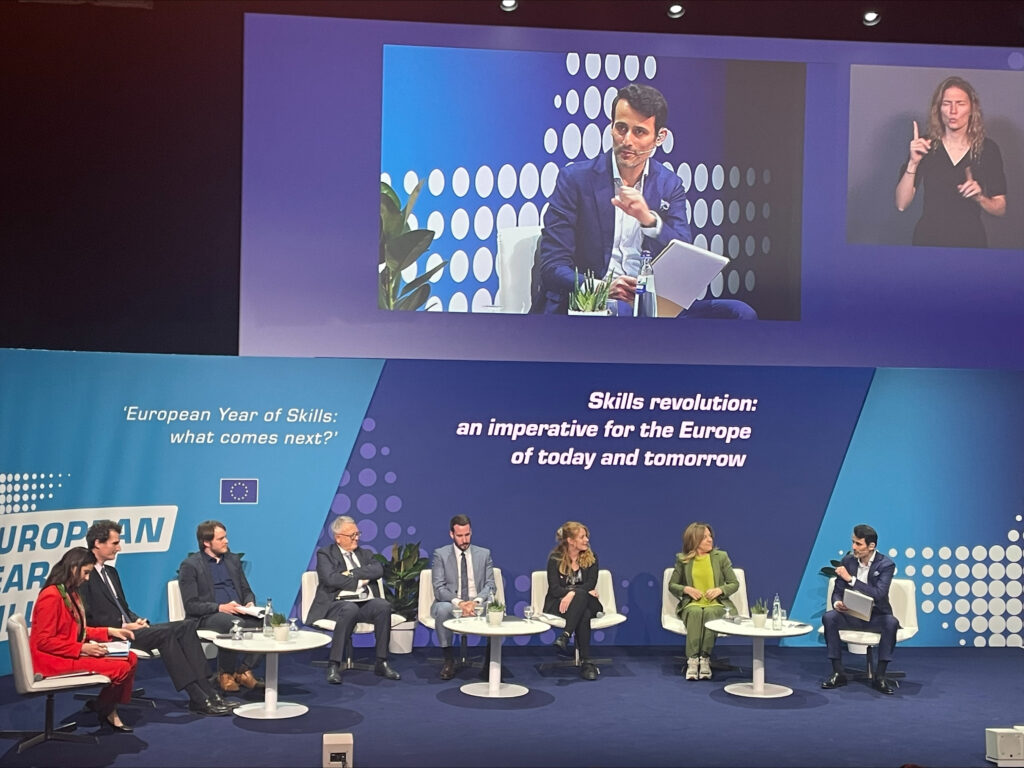European Year of Skills – what comes next? closing event
03/05/2024

On 30 April 2024, the European Commission organised the closing event of the European Year of Skills – what comes next? in Brussels. The conference gathered hundreds of participants from all over Europe to look back at the achievements of the Year and reflect on the next steps. All the speakers and participants agreed that the European Year of Skills does not end here, and that everyone is committed to fostering “skills” as a top priority in the political agenda and to making a true “decade of skills.” EARLALL participated in 12 in-person events organised by the European Commission or other relevant EU Institutions, organised 11 webinars as well as 5 in-person events, and is proud that all of its members contributed to the year through these initiatives.
The conference featured political and stakeholder panels, inspiring speeches, insightful conversations, and interactive discussion groups on specific topics. Margrethe Vestager, Executive Vice President of the European Commission for a Europe fit for the Digital Age opened the conference by highlighting that “the end of the European Year Of Skills is more of a beginning, a beginning with a renewed focus, enthusiasm, and obligation to take action.” In addition, she stressed the importance of the “lifelong learning dimension of this year.” Ms Vestager also mentioned that “skills cannot be hand-delivered by the Brussels’ bubble. This can’t be done without the cooperation of many stakeholders at the national and regional level.”
The national coordinators of the Year shared their activities to organise local initiatives to place “skills” as a top priority. Participants were then invited to reflect on the “skills revolution” through a panel session with representatives from Public Employment Services (Brussels Public Employment Service), VET providers (EfVET), learners and young generations (European Apprentices Network and Organising Bureau of European School Student Unions), economic sectors (European Builders Confederation and Danish State Railways) and European Associations (Lifelong Learning Platform). To achieve the so-called “skills revolution” panellists agreed that we need to place inclusion strategies and the human aspect at the centre of the discussion and to start thinking globally to act locally. Tools such as validation, assessment, guidance or quality assurance are key element to support individuals in their learning and skilling processes. The event was also an occasion to welcome the Pact for Skills member number 2.500.
The event also spotlighted two of the main European Agencies that work to put the skills on the top of the agenda: European Training Foundation and Cedefop. Manuela Prina, Head of Skills Identification and Development Unit, European Training Foundation (ETF) and Jürgen Siebel, Executive Director of Cedefop, called for a “century of skills” in Europe and beyond.
After the political perspectives, three young people were invited to inspire the audience, through slam poetry, and they managed to pitch the aspirations of the young generation.
The first part of the afternoon was dedicated to group discussions on Skills-first approaches, Better skills intelligence and smarter use of it, Upskilling and reskilling approaches: empowering individuals, Investment in skills: agile funding approaches for public-private partnerships, Addressing skills shortages: which innovative solutions?, The Human Edge: leveraging transversal skills in the AI-driven workplace. In the session dedicated to Better skills intelligence, EARLALL brought messages from the local and regional authorities by sharing local initiatives to promote better use of skills intelligence and network involvement in several skills projects (LCAMP, TRAILS, SKYLA). As a result of EARLALL’s contributions the following statement was selected “regional/local skills strategies with all the key stakeholders in the skills ecosystems are needed to better understand and respond to social, regional, and economic needs. Think globally, act locally.”
Industry and policy makers representatives were invited to the final panel discussion. Nicolas Schmit, European Commissioner for Jobs and Social Rights, stressed the “right to be skilled or up and reskilled”, he added that we need give learning opportunities for everyone, showing to people that they have a chance within the society and to evolve in their current jobs.” He then closed the Conference by saying that “We must change our attitude towards skills, and that’s why the #EuropeanYearOfSkills was a great exercise. The spark is there; now we have to get the fire burning.”
EARLALL’s contribution to the European Year of Skills
EARLALL participated in 12 in-person events organised by the European Commission or other relevant EU Institutions, organised 11 webinars as well as 5 in-person events, and is proud that all of its members contributed to the year through these initiatives.
The year has given skills and lifelong learning a refreshed focus and has allowed EARLALL and its member regions to increase the exchange and visibility of best practices related to skills at the local level. EARLALL warmly welcomed the year and committed to continuing its efforts through its lifelong learning priorities.
[ssba-buttons]

